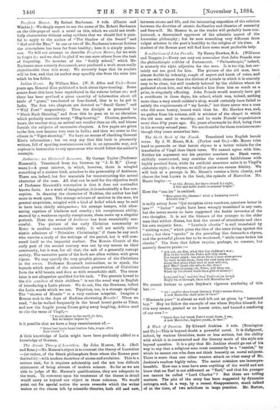The Atomic Theory of Lucretius. By John Masson, M.A. (Bell
and Sons.)—Mr. Masson's object is to contrast the theory of Lucretius —(or rather, of the Greek philosophers from whom the Roman poet derived it)—with modern doctrines of atoms and evolution. This is a serious task, for it requires scholarship and the not less difficult attainment of being abreast of modern science. So far as we are able to judge of Mr. Masson's qualifications, they are adequate to the work. To comment upon his treatment of the theme in detail would carry us beyond our object in these columns. We would point out for special notice the acute remarks which the writer makes on the chasm left by scientific theories, both old and new,
between atoms and life, and the interesting exposition of the relation between the doctrine of atomic declination and theories of necessity and free-will. Mr. Masson is, as the reader will probably have con- jectured, a determined opponent of the atheistic, aspect of the Lnoretian philosophy ; but he sees something very different from vulgar atheism in the poet's hostility to the religion of his time. A student of the Roman poet will find here some most profitable help.














































 Previous page
Previous page